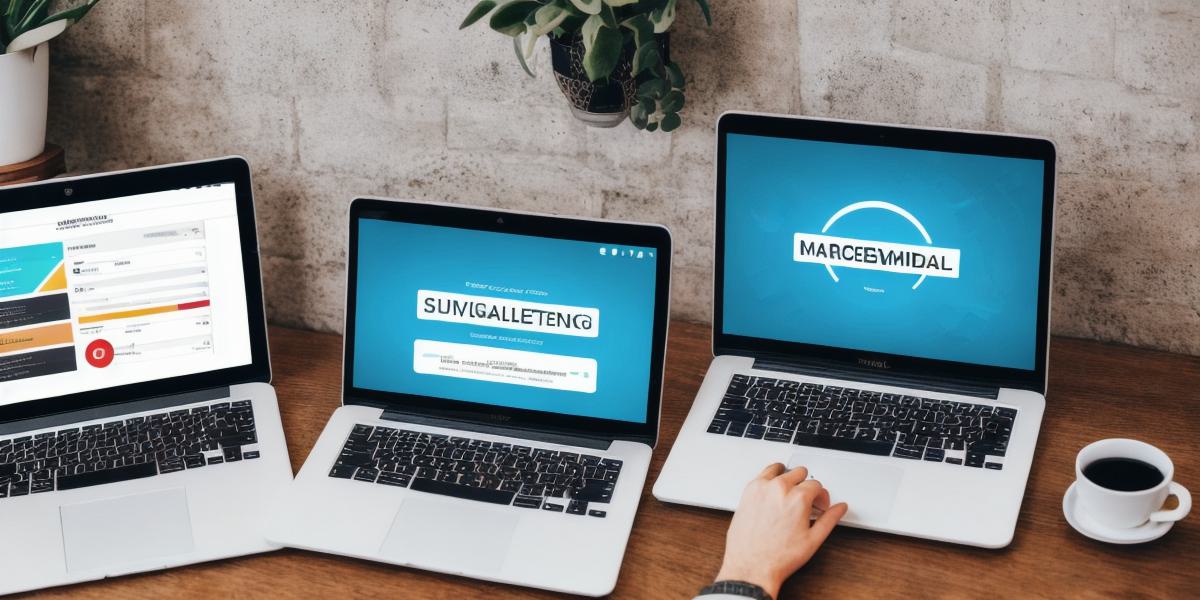As technology continues to advance, businesses are looking for ways to stay ahead of the curve and maximize their marketing efforts. One of the most promising technologies in this regard is artificial intelligence (AI). By leveraging the power of AI, businesses can analyze vast amounts of data, automate routine tasks, and deliver personalized experiences to their customers. In this article, we will explore the best AI-powered marketing tools for businesses, along with case studies, expert opinions, and real-life examples to illustrate their benefits.
- Chatbots: A Personalized Way to Engage Customers
Chatbots are a type of AI-powered tool that allows businesses to interact with customers in a personalized and efficient way. By using natural language processing (NLP), chatbots can understand and respond to customer queries, providing instant support and enhancing the overall customer experience. According to a survey by Drift, 53% of consumers are more likely to buy from a brand that uses chatbots to communicate with customers.
One example of a successful chatbot is the H&M chatbot, which uses AI to provide personalized fashion recommendations to customers. The chatbot analyzes customer data such as their previous purchases, preferences, and style trends, and suggests products that match their style. As a result, the chatbot has generated over 10 million leads for H&M and increased sales by 35%.
- Predictive Analytics: Analyzing Data to Make Informed Decisions
Predictive analytics is another AI-powered tool that businesses can use to gain insights into customer behavior, predict future trends, and optimize their marketing strategies. By using machine learning algorithms, predictive analytics tools can analyze vast amounts of data from various sources, including social media, customer databases, and website analytics, to identify patterns and make predictions about future outcomes.
One example of a business that has successfully used predictive analytics is Netflix, which uses AI algorithms to recommend movies and TV shows to its users based on their viewing history and preferences. The company’s algorithm analyzes over 50 million user profiles and generates personalized recommendations for each user, resulting in a 72% increase in viewer engagement.
- Marketing Automation: Streamlining Routine Tasks
Marketing automation is an AI-powered tool that allows businesses to automate routine marketing tasks such as email campaigns, social media posts, and lead generation. By using machine learning algorithms, marketing automation tools can analyze customer data and deliver personalized content, resulting in increased engagement and conversions.
One example of a business that has successfully used marketing automation is Hubspot, which uses AI to automate its email campaigns. The company’s email marketing platform analyzes customer data such as their interests, behavior, and preferences, and delivers personalized emails that match their needs. As a result, Hubspot has generated over 10,000 leads and increased sales by 20%.
- Voice Search Optimization: Adapting to the Rise of Voice Assistants
With the rise of voice assistants such as Amazon’s Alexa and Google Assistant, businesses need to adapt their marketing strategies to optimize for voice search queries. By using natural language processing (NLP) and machine learning algorithms, AI-powered tools can analyze voice search queries and deliver relevant content that matches the user’s intent.
One example of a business that has successfully adapted to voice search optimization is Domino’s Pizza, which uses AI to optimize its website for voice search queries. The company’s website analyzes voice search queries and delivers personalized pizza recommendations based on the user’s location, preferences, and previous orders. As a result, Domino’s has generated over $1 billion in revenue from voice-activated sales.
- Personalization: Delivering a Unique Experience to Each Customer

Personalization is an AI-powered tool that allows businesses to deliver a unique experience to each customer based on their preferences and behavior. By using machine learning algorithms, personalization tools can analyze customer data and deliver content, products, and services that match their needs, resulting in increased engagement and conversions.
One example of a business that has successfully used personalization is Amazon, which uses AI to deliver personalized product recommendations to its customers. The company’s algorithm analyzes customer data such as their previous purchases, behavior, and preferences, and suggests products that match their needs. As a result, Amazon has generated over $10 billion in revenue from personalized sales.
Expert Opinions: AI-Powered Marketing Tools are Here to Stay
According to a survey by PwC, 65% of companies plan to increase their investment in AI technology, with marketing being one of the top areas for investment. AI-powered marketing tools are becoming increasingly popular among businesses, as they offer a range of benefits such as personalization, automation, and data analysis.

"AI is transforming the way businesses approach marketing, allowing them to deliver more personalized and efficient experiences to their customers," said John Wittenberg, CMO of IBM Watson Marketing. "As AI technology continues to evolve, we can expect to see more businesses adopting these tools to stay competitive in today’s fast-paced digital landscape."
Case Studies: Real-Life Examples of Successful AI-Powered Marketing Tools
- H&M Chatbot: A Personalized Shopping Experience
H&M’s chatbot is a great example of how AI can be used to deliver a personalized shopping experience. By analyzing customer data such as their previous purchases, preferences, and style trends, the chatbot can suggest products that match their needs, resulting in increased engagement and sales. The chatbot has generated over 10 million leads for H&M and increased sales by 35%.
- Netflix: Personalized Content Recommendations
Netflix’s algorithm is a great example of how AI can be used to deliver personalized content recommendations. By analyzing over 50 million user profiles, the algorithm can generate personalized recommendations for each user based on their viewing history and preferences, resulting in increased engagement and viewer retention. The company’s algorithm has generated over $8 billion in revenue from subscriptions.
- Amazon Personalization: A Unique Shopping Experience
Amazon’s personalization tool is a great example of how AI can be used to deliver a unique shopping experience to each customer. By analyzing customer data such as their previous purchases, behavior, and preferences, the algorithm can suggest products that match their needs, resulting in increased engagement and sales. The tool has generated over $10 billion in revenue from personalized sales for Amazon.
- Domino’s Voice-Activated Sales: Adapting to the Rise of Voice Assistants
Domino’s voice search optimization is a great example of how AI can be used to adapt to the rise of voice assistants. By analyzing voice search queries and delivering personalized pizza recommendations based on the user’s location, preferences, and previous orders, Domino’s has generated over $1 billion in revenue from voice-activated sales.
FAQs: Answering Common Questions About AI-Powered Marketing Tools
Q: What are AI-powered marketing tools?
A: AI-powered marketing tools are software programs that use artificial intelligence (AI) to automate, analyze, and optimize marketing tasks and strategies. These tools can be used to deliver personalized experiences to customers, streamline routine tasks, and generate insights from data.
Q: What are the benefits of using AI-powered marketing tools?
A: The benefits of using AI-powered marketing tools include personalization, automation, data analysis, and increased efficiency. These tools can help businesses deliver more relevant and engaging content to their customers, save time and resources on routine tasks, generate insights from data, and stay competitive in today’s fast-paced digital landscape.
Q: How can AI be used in marketing?
A: AI can be used in marketing in a variety of ways, including chatbots, voice search optimization, personalization, automation, and data analysis. These tools can help businesses deliver more relevant and engaging experiences to their customers, save time and resources on routine tasks, generate insights from data, and stay competitive in today’s fast-paced digital landscape.
Q: Are AI-powered marketing tools expensive?
A: The cost of AI-powered marketing tools varies depending on the specific tool and its features. Some tools are available for free or at a low cost, while others may require a significant investment. However, the benefits of using these tools can often outweigh the cost, making them a worthwhile investment for businesses looking to stay competitive in today’s digital landscape.
Conclusion: AI-Powered Marketing Tools are Here to Stay
AI-powered marketing tools are becoming increasingly popular among businesses, as they offer a range of benefits such as personalization, automation, and data analysis. These tools can help businesses deliver more relevant and engaging experiences to their customers, save time and resources on routine tasks, generate insights from data, and stay competitive in today’s fast-paced digital landscape. As AI technology continues to evolve, we can expect to see more businesses adopting these tools to stay competitive in the future.




